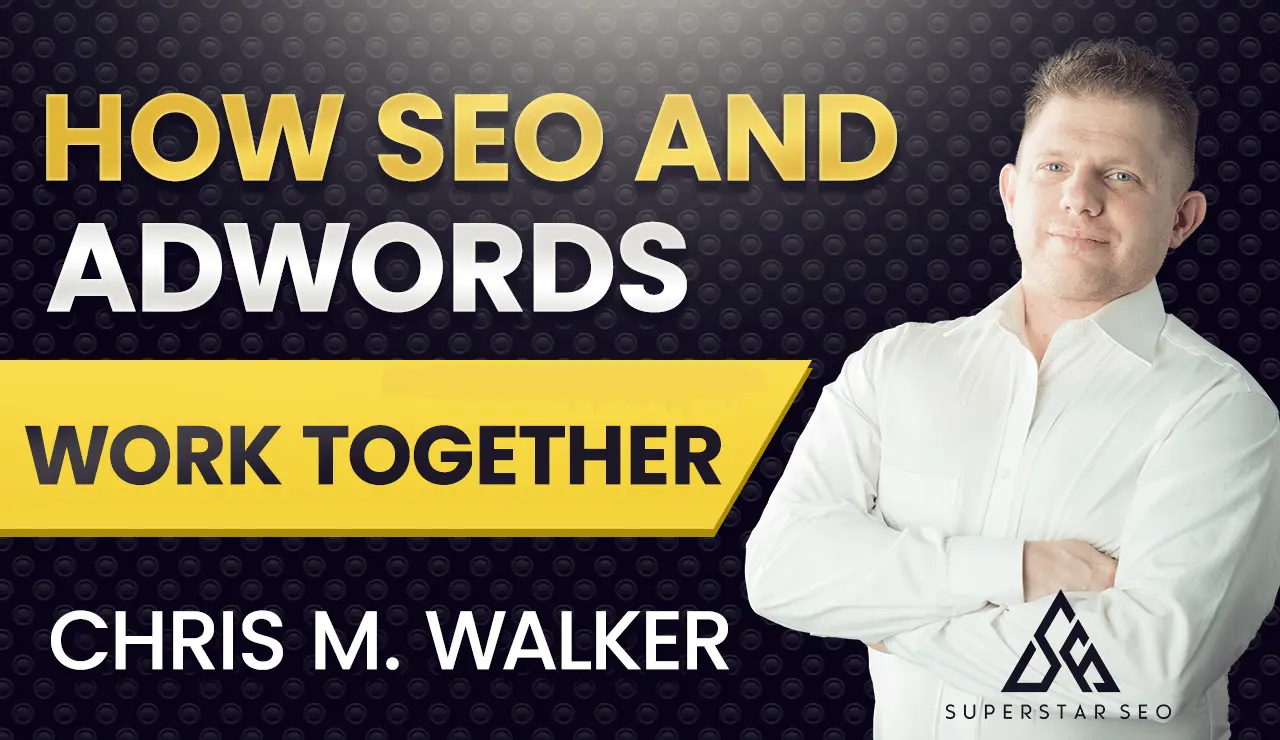If you have been creating a marketing strategy for your business, you’ve probably come across SEO and PPC.
While they are both effective on their own, they can also be extremely powerful when combined.
Throughout this article, we’re going to look at how SEO and Adwords work together.
SEO and PPC: What Are They?
To ensure we’re on the same page (hopefully the first), I wanted to explain what SEO and PPC are.
SEO – Search Engine Optimization (SEO) is the process of optimizing your website so that search engines find and rank it.
PPC – Adwords is a type of pay-per-click (PPC) advertising. It’s the ad channel by Google that lets you run ads above the organic search results.
As Google owns YouTube, Adwords also lets you run ads there.
Does PPC Advertising Affect Search Engine Optimization?
There is a debate amongst marketers whether PPC advertising has a direct impact on search engine optimization.
Some say that it does because of the user behavioral metrics; others say it doesn’t. There have also been studies to support both sides, which doesn’t exactly help the debate.
Therefore, it probably has a minimal direct impact.
However, when used in combination, they still have numerous benefits for your marketing strategy. This is also why often, you’ll search for a product, and you see huge companies like Amazon in both the ads and the organic results.
Interestingly, SEO/Search Engine Optimization can significantly affect Google Adwords thanks to the “quality score,” but we’ll talk more about that later on.
How SEO and AdWords work together: 7 Ways
Here are the seven ways SEO and Adwords work together:
Dominate the Search engine results pages
- Build Brand Awareness & Trust
- Share Keyword Data
- Share Behavioral Daa
- Combat Negative PR
- Testing various aspects
- Get the best of both worlds
As you can see, there are many ways that SEO and Adwords can work together.
Using both search engine optimization and pay-per-click (PPC) ads, you can gain the best of both worlds. Below, I’ve explained in a little more detail why using them in combination is effective for your search engine marketing.
Dominate The SERP
One of the biggest benefits of using SEO and PPC together is that it gives you maximum visibility.
This will greatly benefit your web presence because it will give you the most opportunities to get in front of your target audience.
SEO efforts alone would only get you in the organic listings. Therefore, you’d lose out on all visitors clicking on ads.
On the other hand, a search ads campaign would lose out on all the visitors that skip the ads.
By combining SEO and PPC, you can dominate the SERP and have the best possible online presence.
Brand Awareness & Trust
SEO and PPC are great at building brand awareness, as you can quickly get in front of many users. They both connect your brand to relevant keywords, which is essential for your marketing strategy.
However, it’s also no secret that most users still don’t trust ads or at least feel slightly more suspicious about them. In fact, over 94% of traffic goes to organic rankings, which shows that a lot of users trust it more.
By doing SEO too, you can build additional trust, which will make your ads more effective. Again, this is because they will be more trustworthy, so they’ll convert better.
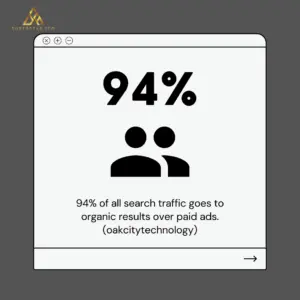
Share Keyword Data
One of the biggest advantages of using SEO and PPC is that you get more data to analyze.
This can help your keyword strategy for both sides tremendously, as it can give you ideas and data you wouldn’t have otherwise.
For example, you might get a lot of traffic to one of your pages organically for a search phrase you didn’t expect to rank for. Now, you can use this data, or maybe even the keywords themselves in the PPC campaign.
Related: Keyword Research Made Easy
Combat Negative PR
If you have negative PR on your brand, the more positive visibility you control, the less likely it will affect you.
You can do some keyword research to find search terms that present negative PR about your brand. Then, you can run both PPC ads and SEO campaigns on those keywords to mitigate the effects of the negative PR.
By doing this, you will benefit your overall PPC and organic efforts, as your conversions will be higher.
Testing Various Aspects
Another way SEO and PPC work together is through testing. Not only does it give you data, as already mentioned, but you can also test your Ad copy and content to get the best results.
For example, you can see how the content on your landing pages performs, or you can test different pop-ups in different ways.
You can also use this to mitigate the risks of wasting your budget. For example, if you want to run a complete SEO campaign for a keyword, you can run PPC ads with a small budget first. This way, you can see whether the keyword converts well before investing your time and money into an organic campaign.
Get The Best of Both Worlds
No matter whether you prefer SEO or PPC, you’ll know that they both have some benefits over each other.
By combining SEO and PPC, you get the best of both worlds and build the ultimate marketing and content strategy for your business.
Many marketing campaigns limit themselves to one, which isn’t necessary. You can split your budget between them when campaign planning and dominate the SERP. We’ll talk more about how to split your budget later on in this article too.
Below, you can also see the benefits of pay-per-click ads and organic traffic for your business. By using both, you get the full list for your target pages.
SEO benefits compared to PPC:
Here are the main benefits of SEO compared to PPC:
More affordable traffic in the long term – SEO is more affordable in the long term because you don’t have to pay for every single click. Therefore, you can generate traffic from a keyword without having to constantly pay for every single visitor.
Can bring you more unexpected traffic – One of the main differences between organic and paid traffic is that organic will bring you more unexpected visitors. For example, if you publish many pages, they will likely pick up a range of long-tail keywords that will bring you traffic. With PPC, you only get the traffic you pay for, so there is no potential for anything like this.
Converts better in most cases because of trust – As already mentioned, organic traffic from Google converts better because the visitor is more likely to trust you.
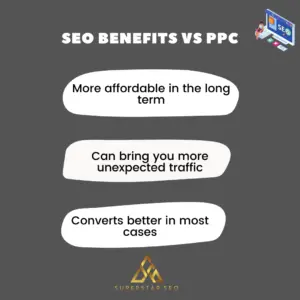
PPC Benefits Compared to SEO
PPC also has some benefits compared to organic traffic.
Faster traffic – One of the biggest benefits of PPC compared to SEO is how fast you can start generating traffic from Google and other search engines. This is also good for when you do want to change a campaign entirely, because with SEO it’s a little harder or more expensive to do.
For a completely new site, it will take you months to start generating significant traffic from SEO. With PPC/Adwords? You can start getting visitors within hours; you just need to pay for the target landing page to appear in the search results.
You don’t need to optimize your page for keywords – Although SEO relevance is beneficial, you are not forced to optimize your website content like you are with SEO. This gives you more freedom to create the pages how you want them, which can, in some cases, increase your conversions. And, it also makes your job a lot easier.
Advertise on any Keyword – Another cool thing about PPC ads is that you can advertise on any keyword. For example, if you have a page about a certain topic, you can’t really rank it for other topics. With PPC, you just pay Google and rank for whatever keyword you want.
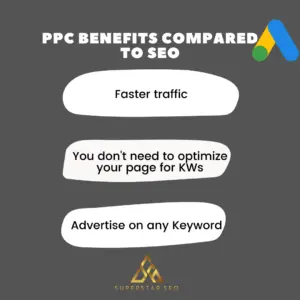
Link-building & Social Media Shares
Another benefit of using both organic traffic and a PPC ad is that you can generate more links and shares. For example, you may have a really shareable piece of content, and by advertising it, the additional eyeballs may share it or even link to it.
This can then help increase your rankings on that particular search phrase.
It can also help you gain more external traffic and more customers, which is another big benefit of combining SEO and AdWords.
Related: How To Build Backlinks For Beginners
SEO Relevance
Finally, there is also the SEO relevance factor for the quality score in Adwords. This is basically that if the PPC ad title and content have little relevance to the user’s SEO search intent, you can get a type of penalty.
This penalty will lead to lower advertising rankings and a higher cost per click that you have to pay.
This is because Google still wants to present the best possible result to the user.
So, to prevent businesses from advertising on random keywords where their page doesn’t match the intent, they have this penalty.
And by optimizing for SEO, you can be sure that your landing page suits the SEO intent. Therefore your cost-per-click, and bid amount will be lower.
Using a combination of SEO and PPC For Your E-commerce Efforts
If you are running an e-commerce store, it makes a lot of sense to use both search ads and SEO for your strategy.
This is because you can get more visibility in the SERP by optimizing your product page for SEO and then running ads on it. Again, this will also get you more affordable ads.
You can also target even more keywords using a blog that links heavily to the target page.
This can also help you increase the rankings and traffic of the target page.
With both channels, there are a lot of opportunities to sell your products, so I would recommend going for both.
Which One Should You Focus More On?
As you can imagine, there is no one size fits all solutions. For some industries and business categories, focusing on SEO will be a lot more effective. For others, AdWords will be better.
The best way to find out is to research your target keywords and look at the organic click-through-rate (CTR).
If the CTR is higher for organic results, it will make sense to put more effort into SEO. And, if it’s higher for PPC, then put your focus toward that.
The other factor is cost. Look at how competitive PPC and SEO for your target keywords are so that you can get an idea of how much it will cost.
If a keyword is more competitive for AdWords, the CPC will be higher.
On the other hand, if a keyword has more organic competition, you’re probably going to need to spend more time/money on backlinks, content, etc.
Once you have an idea of the CTR and cost, you should be able to decide which is better for your business.
How To Set Up SEO and Google Adwords
I also wanted to briefly talk about how you can start running SEO and Google Adwords campaigns. However, these are literally large enough topics to be an entire course, so keep in mind that these are just a broad outline of what you need to do.
How To Set Up SEO For Your Website
Here’s a brief outline of the steps you need to take to set up SEO for your website:
- Research keywords and topics
- Start creating your optimized pages & content
- Completely optimize your pages for on-page SEO
- Ensure your technical SEO is good
- Start building links to increase your authority and rankings
Keep in mind this is a brief outline of how to run an SEO campaign. However, if you would like to learn more about this process in detail, check out the article linked below.
Or, you can also pin the image below to Pinterest, if you’d like to make sure you don’t forget.
Learn How To Setup SEO here: How To Do SEO For a New Website
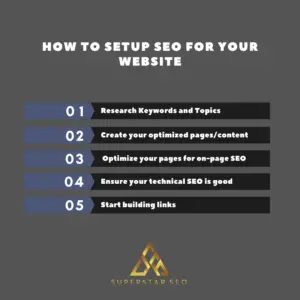
How To Setup a Google Adwords Campaign
Setting up a Google Adwords campaign is a little simpler because there aren’t as many technical steps involved.
- Plan the pages that you want to advertise
- Sign up for a Google Adwords account
- Research profitable keywords
- Go through the setup and start running your ad for your budget/dollar amount
- Split-test your ads on different keywords/pages/etc.
- Make adjustments and keep improving your ad groups
However, that’s not to mean that running an Adwords campaign is somehow easier. In fact, there don’t seem to be as many experts and specialists who work in pay-per-click ads.
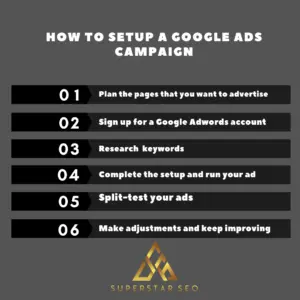
Conclusion
As you have seen throughout this article, running SEO and PPC together gives you maximum visibility on your target keywords.
It also comes with a range of other benefits like allowing you to share data of keywords or even getting more affordable ads.
Therefore, I wouldn’t recommend limiting yourself to one or the other.
Apart from that, my final tips would be thorough campaign planning and testing. Using them in combination allows you to get more data from your users, so make sure to use that.
Subscribe To My Newsletter & Get Updates
I want to invite you to my newsletter, where I share the best SEO and digital marketing tips. Just head over to my homepage and enter your email.
Plus, if you would like to get feedback on your SEO campaigns or just have a few questions, you can also join the Superstar SEO Facebook group.
Read More on SEO
If you would like to read more on SEO, you can also check out some of my recent posts below.
Which SEO is best in the long run?
Freelance SEO: The Ultimate Guide With EVERYTHING You Need To Know
SEO and PPC: Frequently Asked Questions
Lastly, I also wanted to answer some frequently asked questions about combining the two marketing channels.
Does SEO Meta Data Affect Google ads?
No, it does not. It may have a minor impact on the search intent relevance factor discussed earlier. However, you also set up a new set of “metadata” inside Google ads that are displayed on your ads.
Therefore, it is not relevant to the ads you run unless it plays a minimal effect on the relevance.
How Can I Find Keywords For PPC Campaigns For My Website?
Researching keywords for PPC ads is quite similar to finding organic ones. You can use the same tools you use for your organic campaigns (Google KW planner, SEMrush, Ahrefs, etc.)
The main factors to look out for are:
- CPC
- Volume
- Organic CTR
Do SEO Search Algorithms Affect Google Ads?
Yes, they do. How relevant an ad is to the search term is a factor in the quality score, which determines how much you pay per click.
It can also make it harder to rank at the top of the paid results, and your competitors might outrank you with more relevant ads.
Again, this is because Google tries to give users the best possible experience.
My Web Page Is Generating Traffic, But No Conversions – How Can I Fix It?
This is usually between something on the page. The first step is to identify the problem, which you can do through testing and checking the analytics.
However, before you do that, you should also check your site speed and make sure your website runs smoothly on all devices.
If your customers land on pages that are slow or don’t suit their device, they’ll likely leave.
You can also consider installing heatmaps to get a better idea.
Does User Experience Affect Organic and Paid Results?
Yes, it does, as Google always tries to provide the user with the best results. And if you aren’t helping the users, then Google will make it a lot harder for you to appear at the top.



